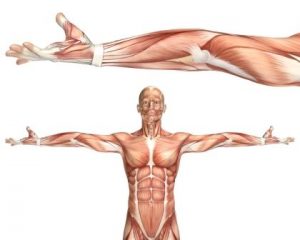Whether you are a newbie to bodybuilding who had to leave a gym soon due to some reason or an old freak who couldn’t work out for some reason, muscle memory is surely a thing of curiosity for all.
So if you have been training for hours at home or just started gyming just to later go on a break due to whatever issues, stressing about losing your muscles and strength is an obvious thing for all of us.
But hey, wait until you read this blog. If you find yourself in precisely such a kind of situation, we are here to help you with some necessary information you wish you had earlier.
The concept or thing called muscle memory comes as a savior. It will likely help you grow sooner than you used to when you began. Sounds something good, right?
Well, let’s know in and out of it for better understanding and also to leave all the anxiousness and stress at bay because you are just going to get better after the break, honey!!!
What Is Muscles Memory In Terms Of BodyBuilding?
Technically, Muscle memory is a form of procedural memory that involves consolidating a specific motor task into memory through repetition. It is helpful to train all the strength and muscle mass sooner than when you tried it for the first time.
You can quickly adapt the skills you have had tried to regain a particular posture, weight, or mass while bodybuilding, lifting weights, and a lot more even after a long break.
This all happens due to muscle memory. Let me try to give you a practical example.
So when you hit the gym, the initial weeks are difficult. But soon, with time, you are able to lift more weight than you earlier did. This does not happen because your body started building up more muscles. But it is due to your improved weight lifting skills.
And the credit clearly goes to muscle cells or nuclei. The human muscles have an epigenetic memory that promotes quick healing and growth naturally as it remembers the lifestyle you decide to provide them, including weight lifting and physical training.
When you bench press for the first time, you obviously waste a lot of energy while balancing the bar, keeping it steady, and moving it in a strong line. But after one or two sessions, things get easier, and your energy is all focused on lifting weight.
So the gains that you have had aren’t forgotten by your muscles either. So now that we know what muscle memory is, let us know how it works to make muscle building easier even after a long gap due to personal reasons.
How Does Muscle Memory Work?

So if you have taken a break from bodybuilding and now are getting back to it, then your muscle memory is at play. The exercise that you will be doing from now on will be called muscle memory bodybuilding. You will be able to regain what you have lost over a period of time quite quickly than you did during the initial days.
There are various biological factors that are at work when it comes to muscle memory bodybuilding, and that’s what we are going to discuss next.
So when you lift the weight, whether as a part of bodybuilding or even in general, on a regular basis, your muscles cells, including their nuclei, start to split into two.
These muscle cells and nuclei then continue growing along with your weight lifting. The longer you do this, the more you stress your muscles more your cells will multiply to meet its demand.
This eventually increases your muscles mass. So when you stop training, these nuclei are left with no reason to split, and ultimately, their growth stops there itself. So you won’t get bigger or even stronger since your muscles are not stressed any further.
These muscle cells start to shrink with time, but they don’t disappear. They are in your body for quite a long time. So when you start lifting weights again or, say, get back to bodybuilding, the same muscle cells get back in the mood to multiply and grow.
How long will the muscle cells retain their memory depend upon different individuals? But approximately, it will last for at least 3 to 6 months or 15 years and sometimes even forever.
So if you are not sure if you would be able to get back in shape after the most extended break you have had, cheer up your muscle cells haven’t given up, and so you too shouldn’t.
Application of Muscle Memory in Your Routine Workout

Now that we know how muscle memory works, knowing few things about its application and the rest few details will surely be helpful.
So, first of all, what you should know is muscle memory won’t get back to work as soon as in your first workout or even in a week when you hit the gym. It takes time, and so it’s necessary to have that patience.
Experts say you won’t be able to see any noticeable difference within the initial two to three weeks, even a month. You may initially even notice a decrease in your strength. But it is part of the process.
Muscle memory helps you regain your muscle mass or even helps you lose it in quite a while. So it is necessary that you avoid the rush. Keep it slow as you don’t want yourself injured.
Enthusiasm is fine, but rushing things won’t make them any better. So when you hit the gym after a break and want to give your muscle memory a kick, instead of starting with a whole-body workout, we recommend focusing on large muscle groups one at a time.
For example, arms and muscle at a day, followed by a leg day on the other. Hustling surely can be a mood after a gap, but make sure rest is given equal importance. Muscle memory ensures that you don’t lose track while you take a rest.
So after a long break, it’s not the only hours of constant exercise that work; it’s a perfect balance of workout and rests along with muscle memory that helps you build up.
Things to Know Before you Hit the Gym After A Break
You don’t want to waste your energy by getting yourself hurt or injured just because you couldn’t control your excitement. The right start is all you need to get muscle memory at play.
But now that we know it takes a bit more time, it is important that you start right. So make sure you start with lifting instead of a full body workout. Stressing or focussing on a particular muscle at a time works well. So pick up weights that feel normal, like lifting weights that are just 60% of your one-repetition maximum test.
Your diet needs your attention too. It might feel much complicated than it ever did, but that is completely fine. Only exercising won’t be enough after a long break. Consider eating more calories than your body burns at a gym, so you don’t end up entirely drained.
A perfect balance of protein and calories will likely help you get in shape sooner. Know that the process still takes time. It is the body that is at play and not a machine that you can build overnight. Bodybuilding is a process, so you don’t want to go wrong anyway.
Make sure you include enough stretching and warm-up exercise and not just weight lifting in abundance. Do things right and in proportion, and that is the only way how muscle memory works.
FAQs About Muscle Memory
Can muscle memory make you gain weight?
Muscle memory refers to muscle fibers regaining the size and strength of muscle faster than they initially gained. So whether you gain weight or no largely depends upon the form of excise and workout you did before you took a gap or the state of excise you indulge in for bodybuilding.
How many reps should you do for muscle memory?
The research says, around 3000 to 5000 reps are enough to regain muscle memory. However, on average, if you wish to do it slowly, 300-500 repetitions develop a new motor pattern, with 3,000 to 5,000 repetitions required to erase and correct a flawed/bad/incorrect motor pattern.
On what muscle memory largely depend?
Coming to a specific motor skill on repetition is what your muscle memory largely depends upon. Muscles don’t remember things on their own, but they are full of neutrons that are attached to your nervous system that plays a vital role in motor learning.
How long does muscle memory last?
The ability of your body to regain previously gained muscle is called muscle memory. Muscle memory can last at least up to 15 years or even forever. It can vary from person to person.
Final Notes on Muscle Memory
So that was all you need to know about muscle memory in terms of bodybuilding. We understand how important it is for you to gain those extra muscles or get in shape. Just make sure you take it slow after a break.
It is often seen that people get back to gyming after a break with a lot of enthusiasm, just to later end up with an injury. The workout should be more focused, which is the only way you can do things quicker.
Hope this helped. Happy Training!!!



I’m 74. Eight months ago I started going to the gym after declining over 40 years. I was shocked to find that muscles I had which were very strong at 16 to 18 yrs. old, now at 74 really zoom up fast. Guys at the gym are commenting on my high poundage for certain muscle groups due to muscle memory. Present ly, I’m looking for ways to make other muscles catch up. The science theory is on this site is correct. D.M.